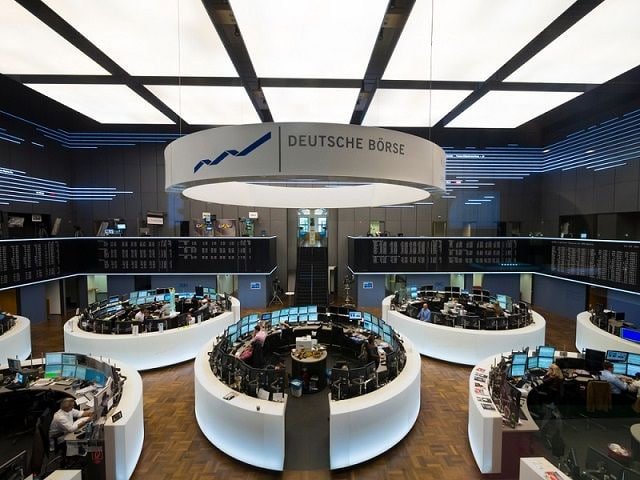Eurozone Economic Confidence: A Glimpse Into the Future
Meta Description: Dive into the latest Eurozone Economic Confidence data for August, exploring its implications for the region's economic outlook. Understand the drivers behind the numbers and what they mean for businesses and consumers.
Imagine this: You're a seasoned investor, meticulously analyzing global economic trends. The Eurozone, a powerhouse of the global economy, has just released its August Economic Confidence data. This single number holds the power to influence your investment decisions, shape your understanding of the region's economic future, and potentially unlock lucrative opportunities. But deciphering the meaning behind the data requires more than just a quick glance. You need a deep understanding of the underlying factors, a keen eye for detail, and the ability to connect the dots between economic indicators and real-world implications.
This is where we come in. We're here to guide you through the intricacies of the Eurozone Economic Confidence data, providing insights that go beyond the surface and empower you to make informed decisions. Prepare to unravel the story behind the numbers, discover the key drivers of economic sentiment, and gain valuable insights into the potential trajectory of the Eurozone economy.
What Does the Eurozone Economic Confidence Index Reveal?
The Eurozone Economic Confidence Index, a key indicator of economic health, has climbed to 96.6 in August, surpassing expectations and the previous month's reading of 95.8. This upward trend suggests a renewed sense of optimism among businesses and consumers within the Eurozone. But what exactly drives this positive sentiment?
The Drivers Behind the Rise
Several factors contribute to this optimistic outlook, painting a complex picture of the Eurozone's economic landscape.
- Resilient Consumer Confidence: The index's rise is largely fueled by a notable uptick in consumer confidence. Despite inflation, consumers seem to be holding firm, with increased optimism about their financial situation and the broader economy. This suggests a willingness to spend, which can act as a powerful engine for growth.
- Business Expectations: The survey also reveals a more positive outlook among businesses, with improved expectations regarding sales and production. This signals a potential for increased investment and job creation, further bolstering the economic outlook.
- Inflation Easing: While inflation remains a concern, there are signs of it easing, providing some relief to businesses and consumers. This easing of inflationary pressures can boost consumer spending and support business profitability.
- Robust Labor Market: The Eurozone continues to enjoy a strong labor market with low unemployment rates. This strong job market provides a solid foundation for consumer spending and economic growth.
Looking Ahead: What Does the Future Hold?
While the current data suggests a positive outlook, it's crucial to understand the nuances and potential risks.
- Geopolitical Uncertainty: The ongoing war in Ukraine and its impact on global energy markets and supply chains remain significant concerns.
- Interest Rate Hikes: The European Central Bank's (ECB) aggressive interest rate hikes to combat inflation could dampen economic activity, potentially impacting business investment and consumer spending.
- Energy Crisis: The ongoing energy crisis in Europe continues to be a major challenge, with potential for further economic disruptions.
The Road Ahead: Navigating the Challenges
Navigating these challenges will require careful policy decisions and a proactive approach from businesses and consumers.
- Targeted Policy Measures: The ECB needs to carefully calibrate its monetary policy to balance inflation control with supporting economic growth.
- Investment in Green Technologies: The Eurozone must accelerate investments in renewable energy sources to reduce dependence on fossil fuels and mitigate the impact of the energy crisis.
- Business Adaptability: Businesses need to be resilient and adaptable, adjusting their operations and strategies to navigate the changing economic landscape.
- Consumer Prudence: Consumers should remain mindful of their finances and prioritize necessities while considering the potential impact of rising interest rates and inflation.
Keywords: Eurozone Economic Confidence, Economic Sentiment, Inflation, Interest Rates, Energy Crisis, Consumer Confidence, Business Expectations
Frequently Asked Questions (FAQs)
Q: What is the Eurozone Economic Confidence Index?
A: The Eurozone Economic Confidence Index is a composite indicator that measures the level of optimism among businesses and consumers within the Eurozone. It's a leading indicator of economic activity, as it reflects the overall sentiment about the future direction of the economy.
Q: How is the Eurozone Economic Confidence Index calculated?
A: The index is calculated using a survey of businesses and consumers across the Eurozone. The survey asks questions about their expectations for the future, including their outlook on sales, production, and employment.
Q: What does a rising Eurozone Economic Confidence Index indicate?
A: A rising index suggests that businesses and consumers are more optimistic about the future of the economy. This can lead to increased investment, spending, and job creation, ultimately boosting economic growth.
Q: What does a falling Eurozone Economic Confidence Index indicate?
A: A falling index suggests that businesses and consumers are less optimistic about the future of the economy. This can lead to decreased investment, spending, and job creation, potentially slowing down economic growth.
Q: Is the Eurozone Economic Confidence Index a reliable indicator of economic performance?
A: The index is a valuable tool for understanding economic sentiment, but it's important to consider it alongside other economic indicators. The index can be affected by temporary factors, and it's not always a perfect predictor of future economic performance.
Conclusion:
The Eurozone Economic Confidence Index provides a crucial snapshot of the state of the Eurozone economy, offering valuable insights into prevailing economic sentiment. While the current data suggests a positive outlook, it's crucial to recognize the potential risks posed by geopolitical uncertainty, interest rate hikes, and the ongoing energy crisis. Navigating these challenges will require proactive policy measures, business adaptability, and consumer prudence. By understanding the complex interplay of these factors, we can better navigate the path toward sustainable and inclusive economic growth in the Eurozone.



